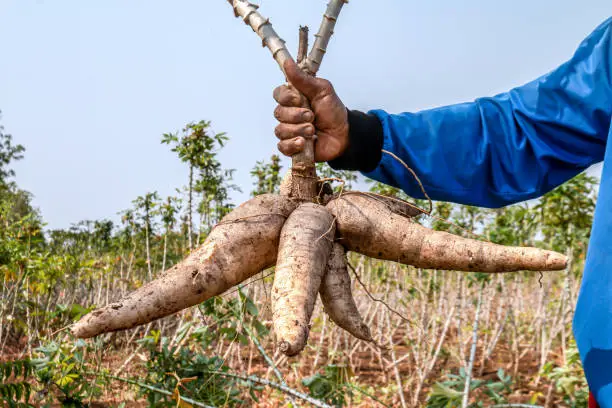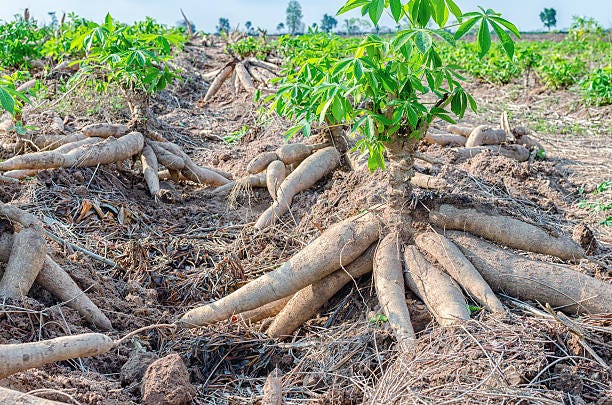
Cassava is one of the most important staple crops in Nigeria, earning its spot as a cornerstone of food security and economic development. As the world’s largest producer of cassava, Nigeria produces over 59 million tons annually, accounting for more than 20% of the global output. This crop’s versatility, resilience, and nutritional value make it an indispensable part of Nigerian agriculture and cuisine.
In this blog post, we’ll delve into everything about cassava farming in Nigeria, including its history, cultivation techniques, economic benefits, and how HTS Farms is revolutionizing cassava farming to meet local and global demand.
What is Cassava?
Cassava (Manihot esculenta) is a tropical root crop native to South America but now widely cultivated in Africa, particularly in Nigeria. Its starchy roots are used to produce a variety of foods such as garri, fufu, tapioca, and starch. The crop also serves as raw material for industrial products like ethanol, animal feed, and biofuel.
History of Cassava in Nigeria
Cassava was introduced to Nigeria by Portuguese traders in the 16th century. Over time, it became a critical staple crop due to its adaptability to various soil types and climates. By the 20th century, cassava had become a lifeline for millions of Nigerians, especially in rural areas where food security is a major concern.
Why is Cassava Important in Nigeria?
1. Food Security
Cassava is drought-resistant and thrives in poor soils, making it a reliable crop for feeding Nigeria’s growing population. Its long shelf life allows farmers to harvest as needed, reducing waste and ensuring year-round availability.
2. Economic Growth
The cassava value chain provides income for millions of Nigerians. Farmers, processors, and marketers all benefit from the crop’s production. It also contributes significantly to Nigeria’s Gross Domestic Product (GDP).
3. Industrial Use
Cassava’s by-products, such as ethanol and cassava starch, are in high demand for industrial applications, including paper manufacturing, pharmaceuticals, and adhesives.
4. Export Potential
Nigeria’s cassava exports, particularly processed products like cassava flour and chips, are increasingly gaining attention in the international market.
Cassava Farming: Step-by-Step Guide
1. Land Preparation
Cassava thrives in well-drained sandy or loamy soil with a pH range of 5.5 to 6.5. Here’s how to prepare your land:
- Clear the Land: Remove weeds, stumps, and debris to allow for easy planting and root penetration.
- Plow and Harrow: Loosen the soil to improve aeration and water infiltration.
2. Selection of Cassava Varieties
Choosing the right cassava variety is crucial for a successful harvest. In Nigeria, improved varieties such as TME 419, NR 8082, and TMS 30572 are popular due to their high yield, disease resistance, and adaptability.

3. Planting
- Planting Time: Cassava is usually planted at the onset of the rainy season (March–April) or during the late planting season (August–September).
- Planting Material: Use stem cuttings from healthy, disease-free plants.
- Spacing: Maintain a spacing of 1m x 1m to allow adequate growth and access for weeding.
4. Weed and Pest Control
Weeding: Weed the farm at least 2-3 times during the growing season to prevent competition for nutrients.
- Pest Control: Common pests like cassava mealybugs and grasshoppers can be managed using biological control methods or pesticides.
5. Fertilization
Apply organic manure or NPK fertilizer to enrich the soil and boost cassava growth. Regular soil testing can help determine the exact nutrient requirements.
6. Harvesting
Cassava is typically ready for harvest 9–12 months after planting. Harvesting is done manually by uprooting the plants or using mechanical harvesters for large-scale farms.
Challenges in Cassava Farming
Despite its benefits, cassava farming in Nigeria faces challenges such as:
- Post-Harvest Losses: Cassava has a high moisture content, making it prone to spoilage if not processed quickly.
- Pests and Diseases: Cassava Mosaic Virus (CMV) and cassava bacterial blight are common threats.
- Limited Mechanization: Many farmers still rely on manual farming methods, limiting productivity.
- Market Access: Farmers often struggle to find reliable markets for their produce.
The Role of HTS Farms in Cassava Farming
At HTS Farms Limited, we are committed to revolutionizing cassava farming in Nigeria. Here’s how:
1. Providing High-Quality Farm Inputs
We supply disease-resistant cassava stem cuttings and fertilizers tailored to Nigeria’s soil conditions, ensuring higher yields for farmers.
SHOP HERE FOR CASSAVA STEMS>>>
2. Modern Agricultural Equipment
Through our agricultural equipment division, we provide tools such as plows, harrows, and mechanical harvesters to enhance productivity.
3. Training and Support
HTS Farms offers training programs on best practices for cassava cultivation, pest control, and post-harvest management.
JOIN OUR TRAINING WAITING LIST HERE>>>
4. Connecting Farmers to Markets
We bridge the gap between farmers and consumers by facilitating access to local and international markets.
5. Promoting Sustainability
We advocate for sustainable farming practices that preserve soil fertility and reduce environmental impact.
Economic Opportunities in Cassava Farming
1. Garri Production
Garri, a staple food in Nigeria, is made from processed cassava. Entrepreneurs can invest in small-scale or large-scale garri production.
2. Cassava Flour
High-quality cassava flour is an excellent alternative to wheat flour and is in demand for making bread, pastries, and noodles.
3. Industrial Products
Cassava starch and ethanol have vast applications in industries, from food processing to biofuel production.
4. Export Markets
Processed cassava products like chips and pellets are highly sought after in international markets, particularly in Europe and Asia.
Health Benefits of Cassava
Cassava is not just a staple food but also a powerhouse of nutrition. Here’s what makes it essential:
- Rich in Carbohydrates: A great energy source for daily activities.
- Gluten-Free: Suitable for individuals with gluten intolerance.
- Vitamin C: Boosts immunity and promotes healthy skin.
- Iron: Supports red blood cell production and prevents anemia.
Sustainability in Cassava Farming
Cassava farming has a low environmental footprint, especially when sustainable practices are adopted. Techniques like crop rotation, organic farming, and integrated pest management ensure long-term soil health and biodiversity.
How to Start a Cassava Farming Business in Nigeria
- Develop a Business Plan: Outline your goals, budget, and target market.
- Acquire Land: Choose land with suitable soil and access to water.
- Source High-Yield Varieties: Purchase stem cuttings from trusted suppliers like HTS Farms.
- Invest in Equipment: Acquire tools and machinery to streamline operations.
- Market Your Products: Identify potential buyers and promote your products through social media, marketplaces, and direct sales.
FAQs About Cassava Farming in Nigeria
1. How profitable is cassava farming in Nigeria?
Cassava farming is highly profitable, with returns depending on the scale of production and market access. Farmers can earn significant profits from processed products like garri, flour, and starch.
2. What are the common diseases affecting cassava?
Cassava Mosaic Virus (CMV), cassava bacterial blight, and root rot are common diseases. Using disease-resistant varieties and good agricultural practices can mitigate these issues.
3. How long does it take for cassava to mature?
Cassava takes 9–12 months to mature, depending on the variety and growing conditions.
In Conclusion
Cassava farming remains a vital part of Nigeria’s agricultural sector, contributing to food security, economic growth, and industrial development. With the right techniques, tools, and support, farmers can unlock the full potential of this versatile crop.
HTS Farms is at the forefront of empowering farmers with the resources and knowledge needed to excel in cassava farming. By adopting innovative practices and connecting farmers to markets, we are driving Nigeria’s cassava industry to new heights.
Ready to start or scale your cassava farming journey? Visit HTS Farms today and let us help you cultivate success!





